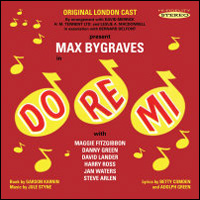
*
Death Takes a Holiday [PS Classics PS-1104]
Maury Yeston has given us a liltingly romantic and lovely operetta-like score in Death Takes a Holiday, the new musical which opened July 21 at the Roundabout Theatre Company's Laura Pels Theatre. I can already hear some readers questioning, "And what show did he see?" Hence, I feel the need to qualify my opening statement. The cast recording of Death Takes a Holiday, just released by PS Classics, is liltingly romantic and lovely. In the theatre, though, you might not have been able to tell.
There are any number of reasons why the same score sung by the same singers (in this case, minus one) using the same pit orchestra might come across as significantly different to the listener. This can be demonstrated by any number of examples; two musicals immediately spring to mind, The Grass Harp and Mack & Mabel. It is hard, based on one in-theatre viewing, to pinpoint just what was wrong with Death Takes a Holiday. I suppose the trouble started with the choice of source material, and continued with the treatment of the source material.
The Roundabout production didn't generate any interest, for me at least, in its opening scene which revealed seven actors making believe they were in a car, speeding over a treacherous mountain pass. Or in the second scene, when they arrived at a grand villa. Or in the third scene, by which point all was lost. This makes a score — even a liltingly lovely one — impossible to absorb.
Can Death Takes a Holiday be improved in future productions? I suppose so. And I do hope so, because Mr. Yeston's score deserves future life. The show had a long and troubled genesis; Yeston and librettist Peter Stone started work in 1997, just after shepherding their Titanic to a Tony Award-winning reception. After several starts and stops and Stone's death in 2003, Tom Meehan (of Annie and The Producers) stepped in to work with Yeston. Book and score do not complement each other, at least not as presented at the Pels.
 |
||
| Jill Paice in Death Takes a Holiday. |
||
| photo by Joan Marcus |
Yeston wrote yet another full-scale musical, one with a pretty good score, but it remains something of a Broadway orphan; unfortunately, some Brit composer simultaneously chose to musicalize the same public domain source material. Yeston's Phantom, with a book by Arthur Kopit (of Nine), was relegated to regional and stock productions (and a cast recording). Along the way it achieved a fair measure of success, although nothing to compare with Lloyd Webber's Phantom of the Opera. The latter has now rolled past the quarter-century mark on Broadway, which leaves Yeston's Phantom — despite a more pleasing score — unlikely to get a local hearing.
Yeston has been active these past 30 years in other musical areas, mind you, and contentedly so; further, one can see how Nine and Titanic makes an impressive enough resume for anyone. Still, many of us would be mighty glad if there were another two or three Yeston musicals in circulation.
Which takes us back to the cast recording of the Roundabout production of Death Takes a Holiday, which sounds infinitely more effective than it did at the Pels. Yeston demonstrates a Continental flair, liberally tossing around lovely melodies. The score is in more than several places reminiscent of Phantom, and why shouldn't it be? All to the good, as far as I'm concerned. There is also a shimmy number, of all things, which seems plucked from Grand Hotel, plus a trio built on what sounds like the waters of Yeston's Grand Canal. (Death Takes a Holiday takes place just outside Venice, after all.) All these musical memories, as far as I'm concerned, are not minuses but distinct plusses.
The cast is led by Kevin Earley, with an asterisk. In an unlikely and unusual occurrence, Julian Ovenden — in the title role, which is to say Death — suffered a severe case of laryngitis (or apparently something more serious). This forced him out of the show two days before the opening. Earley performed as understudy on opening night; when Ovenden withdrew altogether, Earley was promoted to the role.
 |
||
| Kevin Earley |
How was Earley? Can't say, not having seen him. He sounds fine on the cast album, but doesn't provide the extra-special magic that Ovenden did the night I saw him. (And yes, it can indeed come across on a recording; for a demonstration, go listen to Drake and Kiley in Kismet.) This is not, I suppose, exactly fair to Earley — comparing him to someone whose performance has vanished. But listening to the cast album, I do seem to keep remembering how good Ovenden was.
The entire show— not only on the CD but in the theatre — was lifted by the presence of a fine group of singing actors. Jill Paice (Curtains) played the romantic lead, and she was perfectly fine. Unfortunately, she was overshadowed by the presence of Rebecca Luker, playing her mother. Luker is so good just about every time she steps on the stage that at least some viewers found themselves confusedly hoping that Luker would sing the next big romantic ballad. (Her second act solo, "Losing Roberto," was the high point of the show at the Pels.) Michael Siberry, Mara Davi, Linda Balgord, Simon Jones, Don Stephenson, Max von Essen and Matt Cavenaugh all contribute to the pleasures of the recording.
Yeston is especially well served by orchestrator Larry Hochman. Sure, we'd like to hear this score with 20 or 25 pieces, but Hochman — restricted to an expensive-for-Off-Broadway 13 — somehow makes it sound lushly rich. Praise also goes to Kevin Stites, Yeston's musical director from Titanic.
Death Takes a Holiday had a good deal in common, musically and texturally, with The Light in the Piazza. But in the case of the Adam Guettel musical, director Bartlett Sher and producers Andre Bishop and Bernard Gersten found a way to make it all mystically magical. Death Takes a Holiday, at the Roundabout at least, was flat and unengaging.
 |
||
| Cover art for Do Re Mi |
Speaking of Bernie Gersten, Sepia has just brought us the 1961 London cast album of the Jule Styne-Betty Comden-Adolph Green musical Do Re Mi. Which was directed by Gersten, who had been production stage manager of the Broadway edition. Do Re Mi was a troubled show, stemming from the fact that the material doesn't quite add up. The original had Phil Silvers and Nancy Walker on hand to salvage the affair and mesmerize the critics, who seem to have been overly generous. (In my book "Opening Night on Broadway," I calculated the seven first-night reviews as being five raves and two favorables — a rather ecstatic reception.) Even so, audiences didn't respond; Do Re Mi closed at a loss after a mere 11 months. The abbreviated post-Broadway tour was a financial disaster, as was the London edition. Styne, Comden and Green wrote a loud and boisterous score, yes, but without the distinction of items already on their collective resumes (such as On the Town, Gentlemen Prefer Blondes, Wonderful Town, Bells Are Ringing, Gypsy). "Make Someone Happy" stands out as one of their top ballads; otherwise, there are a handful of sturdy show tunes but nothing that approaches the level of the five musicals above.
The London cast album — while clearly and understandably inferior to the New York edition — makes for interesting listening. The understandable inferiority stems from the stars. The leading role in Do Re Mi was not merely created by Silvers; it was written for Silvers, and in places seems to have been improvised by him. London had music hall star Max Bygraves, who might well have been a comic genius for all I know. But this material cries out for Phil Silvers. What we get here is not an imitation, mind you, but the words and the phrasing seem to force Bygraves into an unnatural impersonation.
This is especially clear in the "Late, Late Show" number, which even in Phil's hands was a ragtag sketch. But Silvers made it a comic fiesta, laced with impersonations of Cagney, Bogey, Edward G. Robinson and even some passing machine guns — much of which, I would have to imagine, was contrived by Silvers in the rehearsal hall. What we get in London is Max Bygraves forced to impersonate Phil Silvers impersonating Cagney and Bogey. Nathan Lane did somewhat better when he played the role at City Center Encores in 1999, in a performance captured on CD, but Do Re Mi still seemed like "The Phil Silvers Show" without Phil Silvers.
Nancy Walker, to whose name we really ought to prefix the word inimitable, magnified her material with every breath and sigh. Her character was only given three songs in this non-well-made musical, but sitting at the St. James Theatre you wouldn't have known it. Maggie Fitzgibbon played it in London, and it doesn't amount to much. Nor can Jan Waters equate the comic flair of New York's Nancy Dussault as Tilda Mullen, the pancake house folk singer. The one principal who comes off well is Steve Arlen, in the role created by John Reardon. (Curiously enough, Arlen got his Broadway break in 1970 when he replaced Reardon — prior to the first performance — in Cry for Us All.)
Where this first-time-on-CD recording captures our attention is in the music department. The orchestrations, by Luther Henderson and friends, are marvelously brassy and catch the humor of the show. The London album, recorded by Decca, brings out colors that we don't especially hear on the Broadway album. This will keep those of you who enjoy the score listening intently. Sepia, as usual, adds an assortment of bonus tracks. These include Rose Marie Jun — who regularly recorded demo albums for musicals from the Chappell publishing house — on "Don't Try to Figure It Out" and ""Life's Not That Simple," two songs that were (understandably) cut. But Sepia gives us a true gem in a single of that delicious pastiche "What's New at the Zoo," with the unlikeliest singer imaginable. Who ever thought to mix Styne, Comden & Green with Bea Lillie? But here she is ouching and eeking and making all sorts of zoo sounds. "Unk, eek, ow, oh, oooh" indeed.
(Steven Suskin is author of the recently released updated and expanded Fourth Edition of "Show Tunes" as well as "The Sound of Broadway Music: A Book of Orchestrators and Orchestrations," "Second Act Trouble" and the "Opening Night on Broadway" books. He also pens Playbill.com's Book Shelf and DVD Shelf columns. He can be reached at [email protected].)
Visit PlaybillStore.com to view theatre-related recordings for sale.









